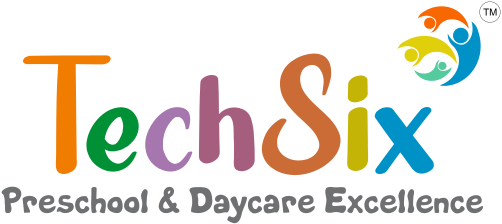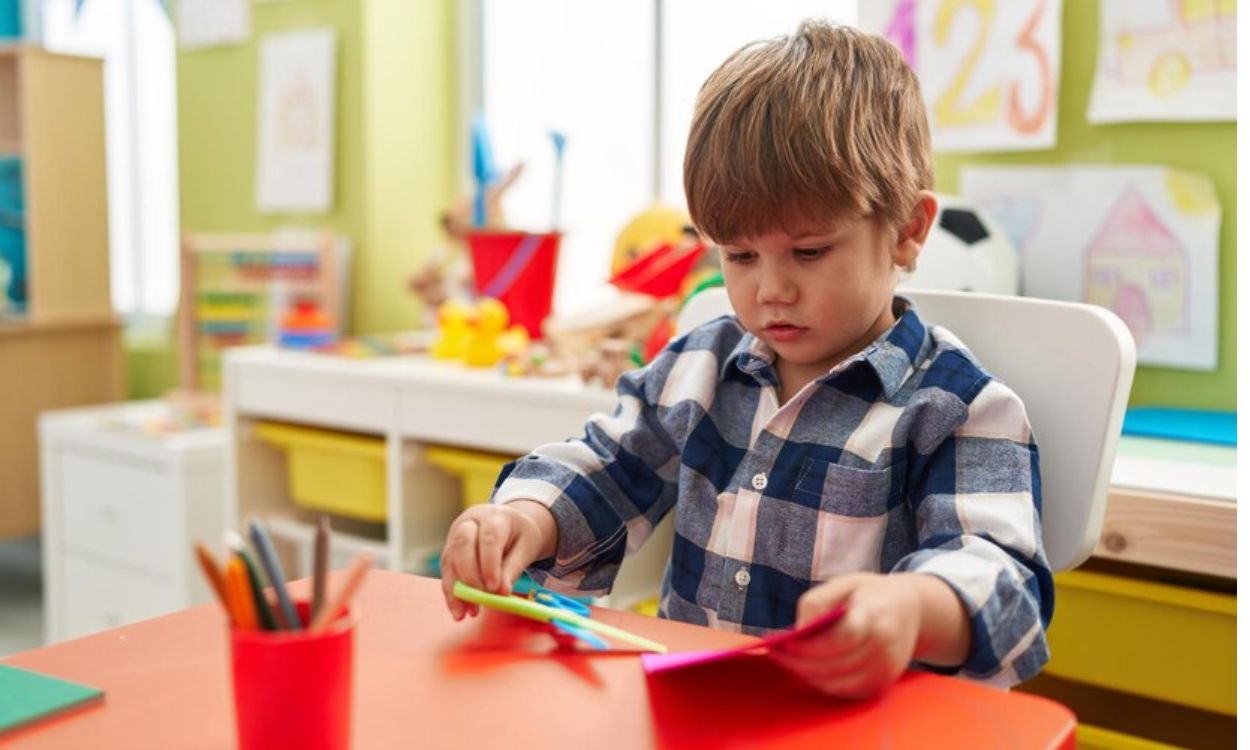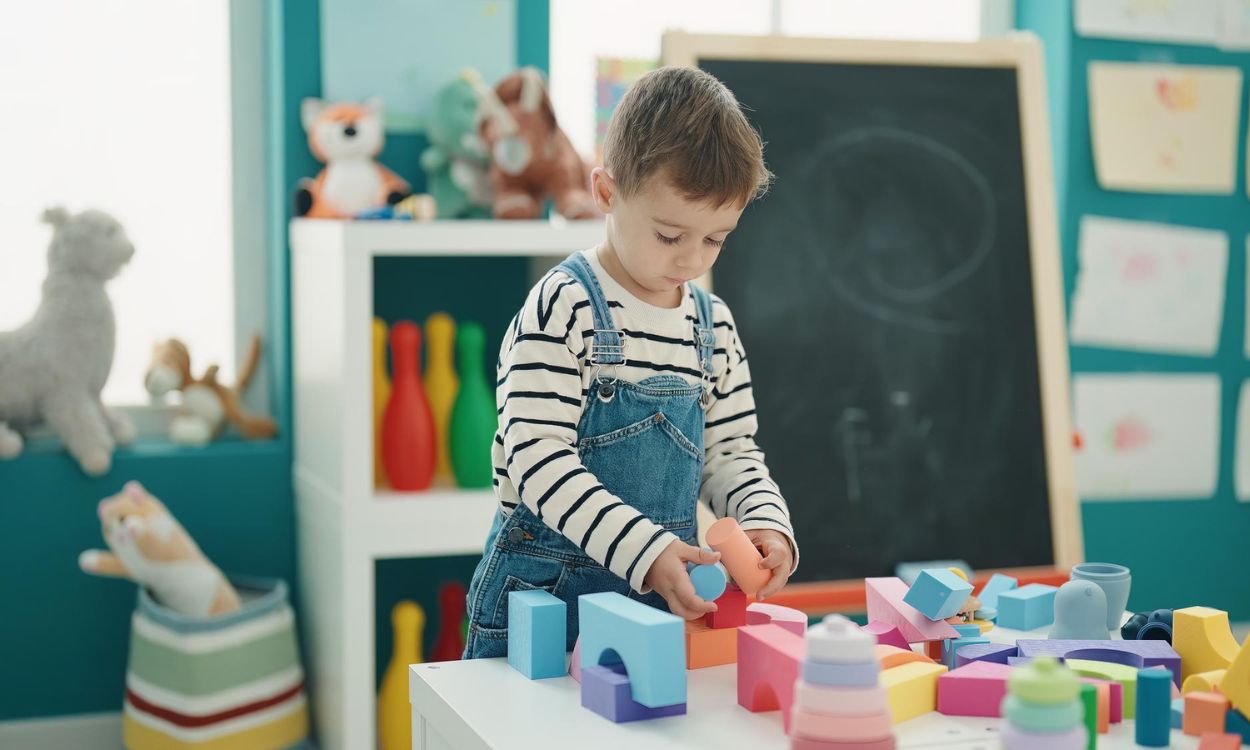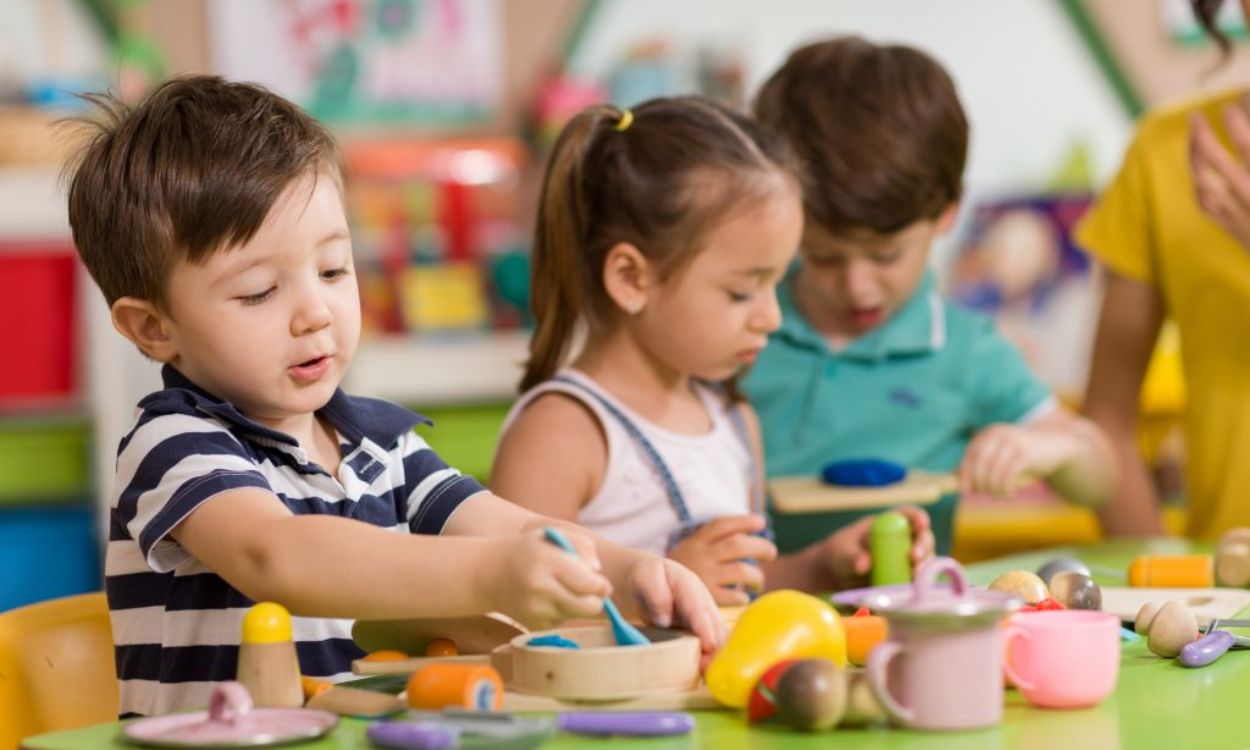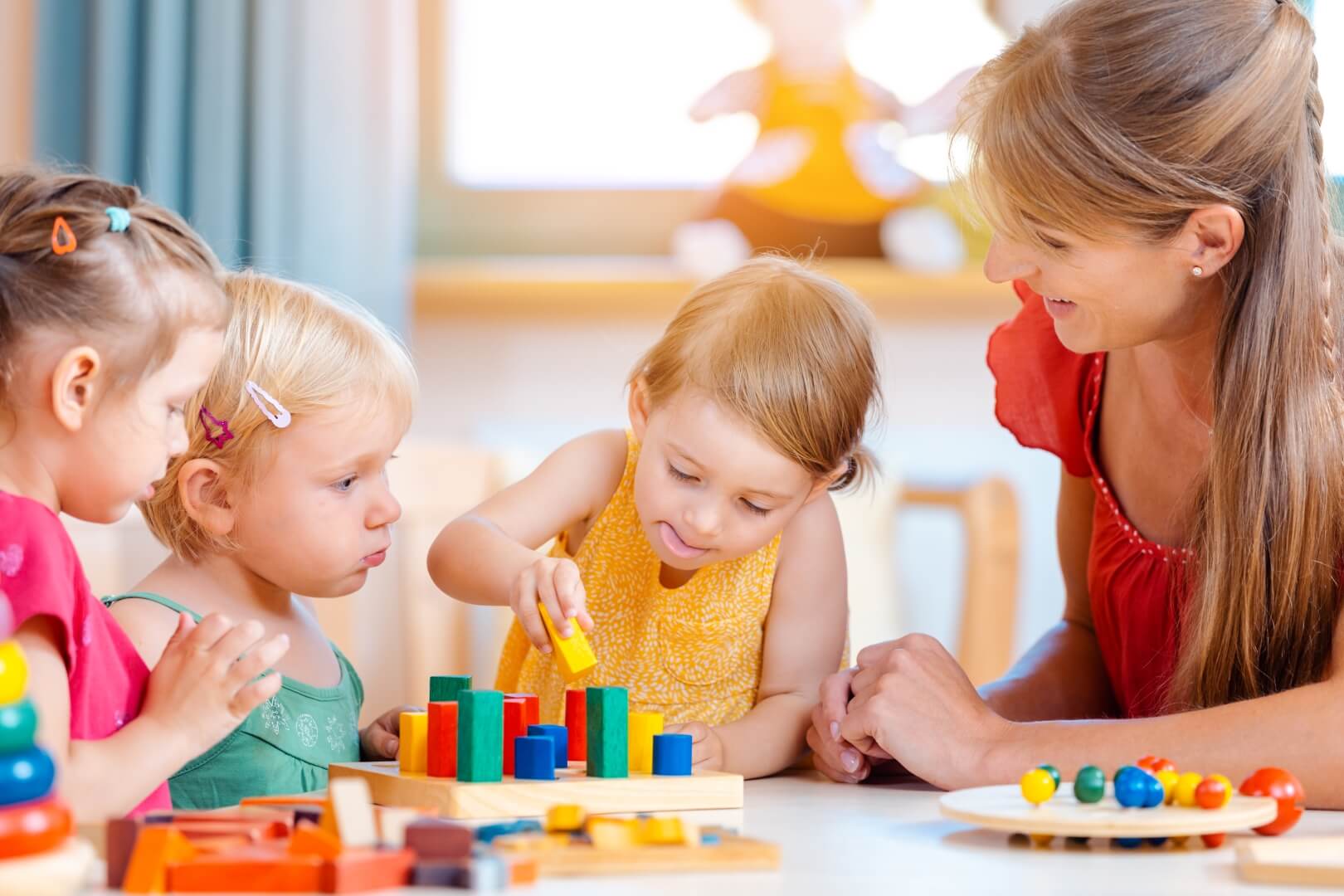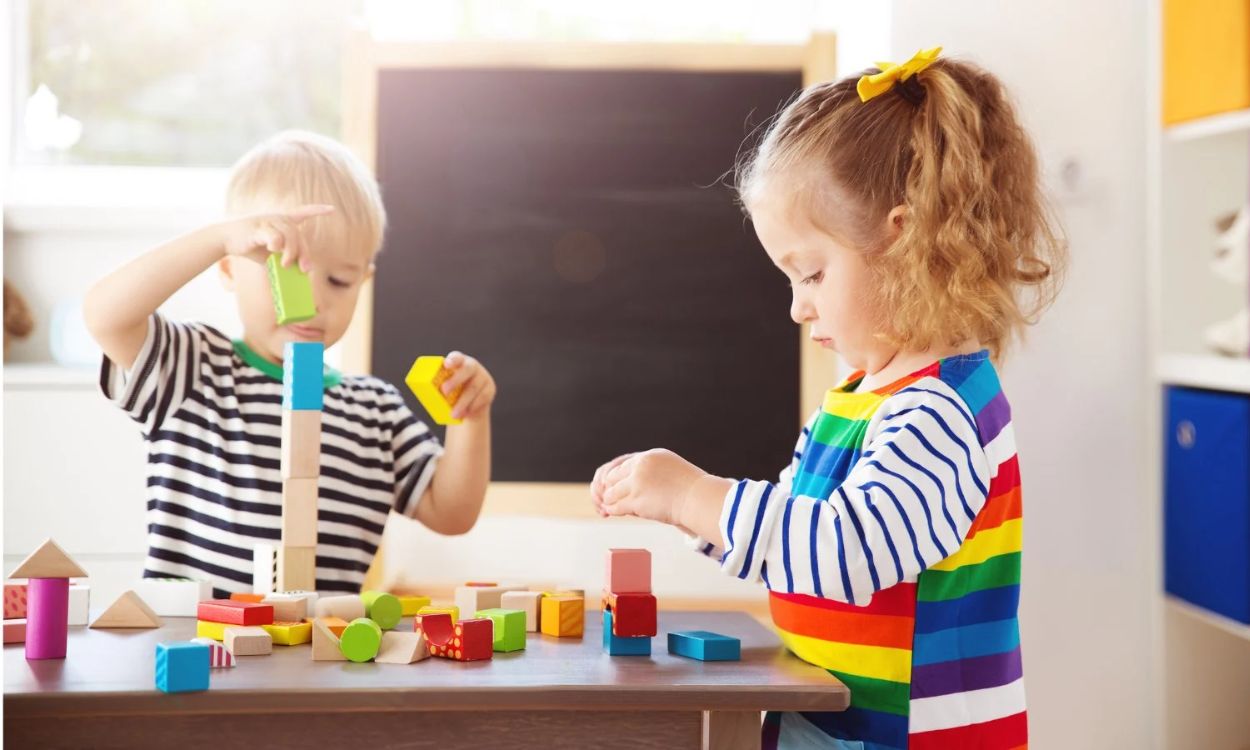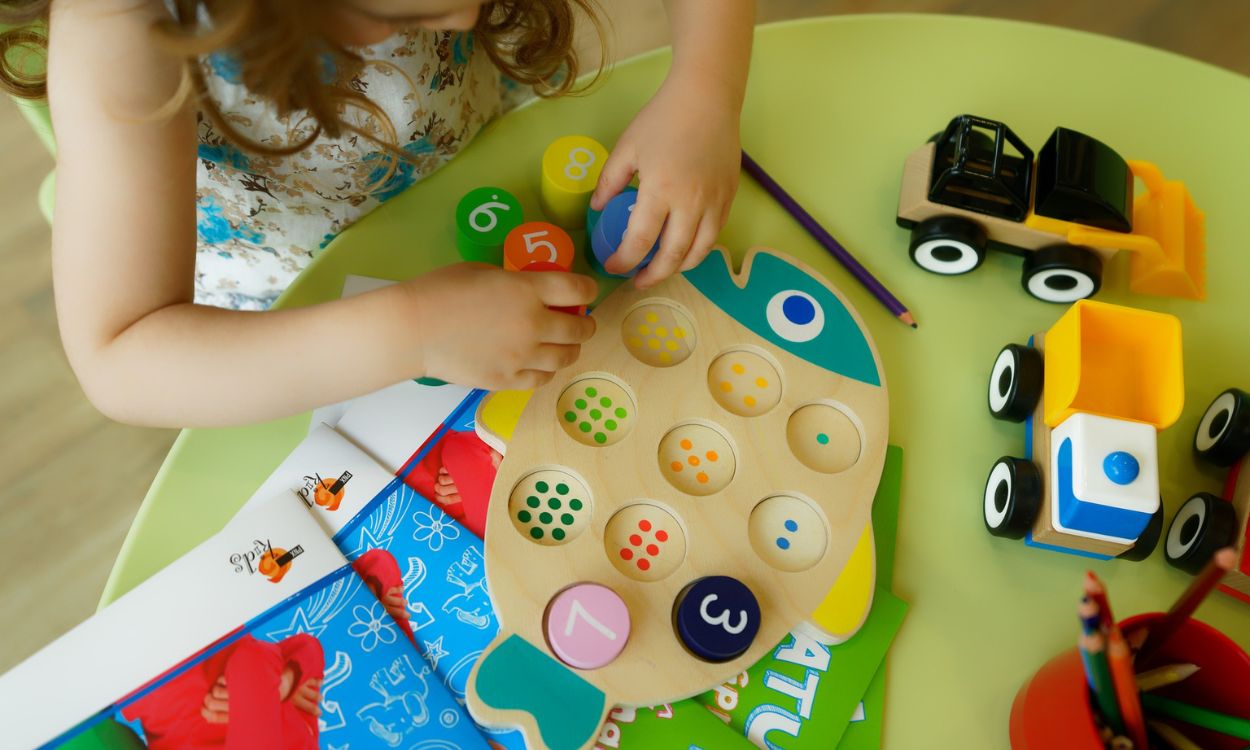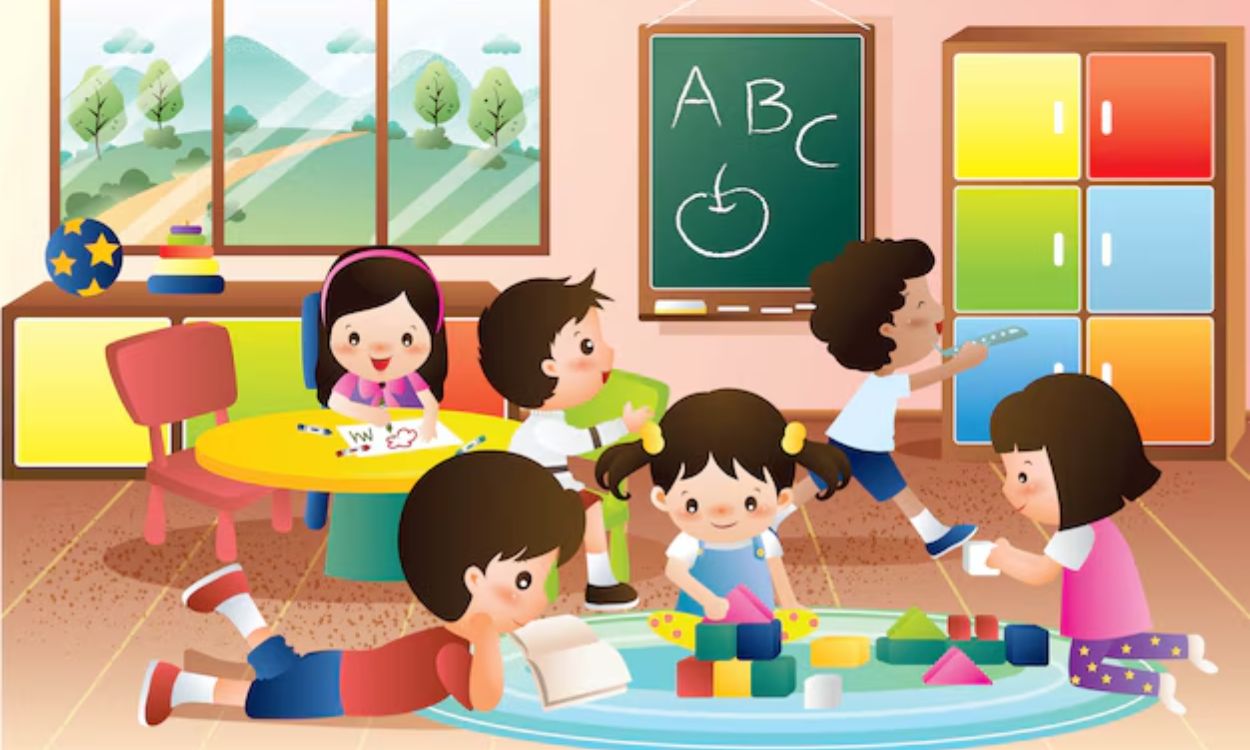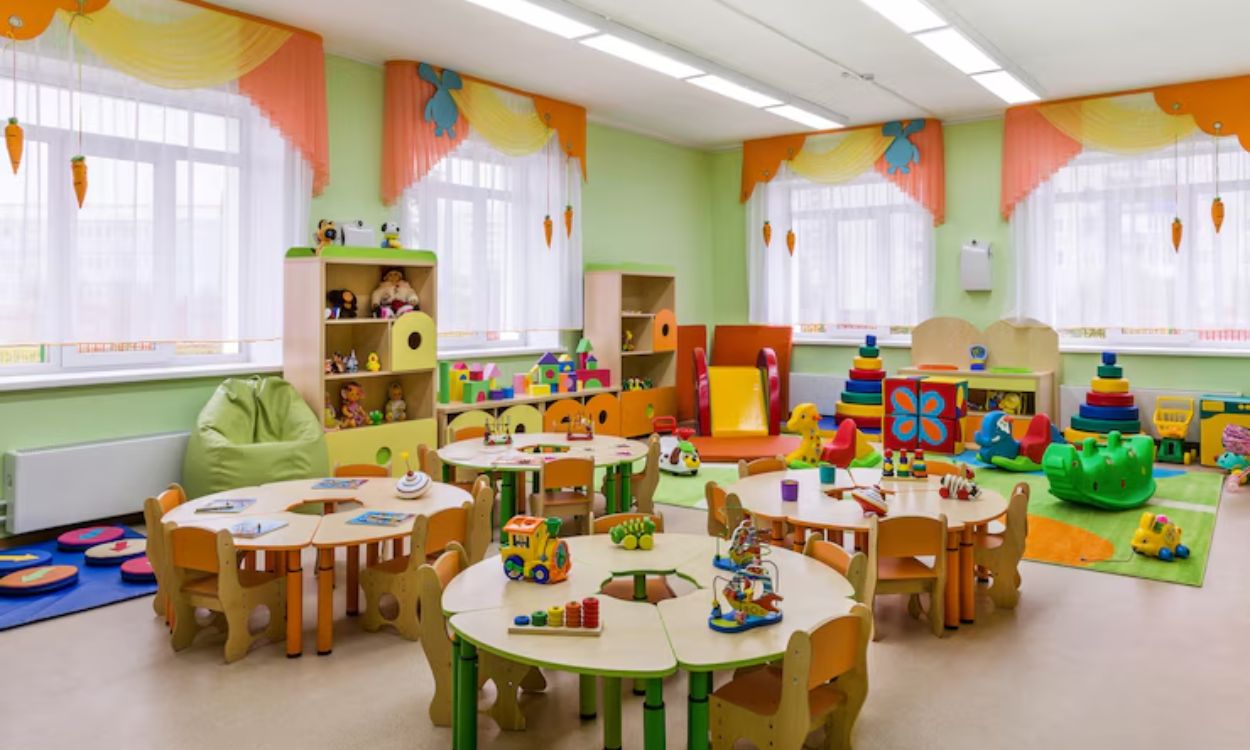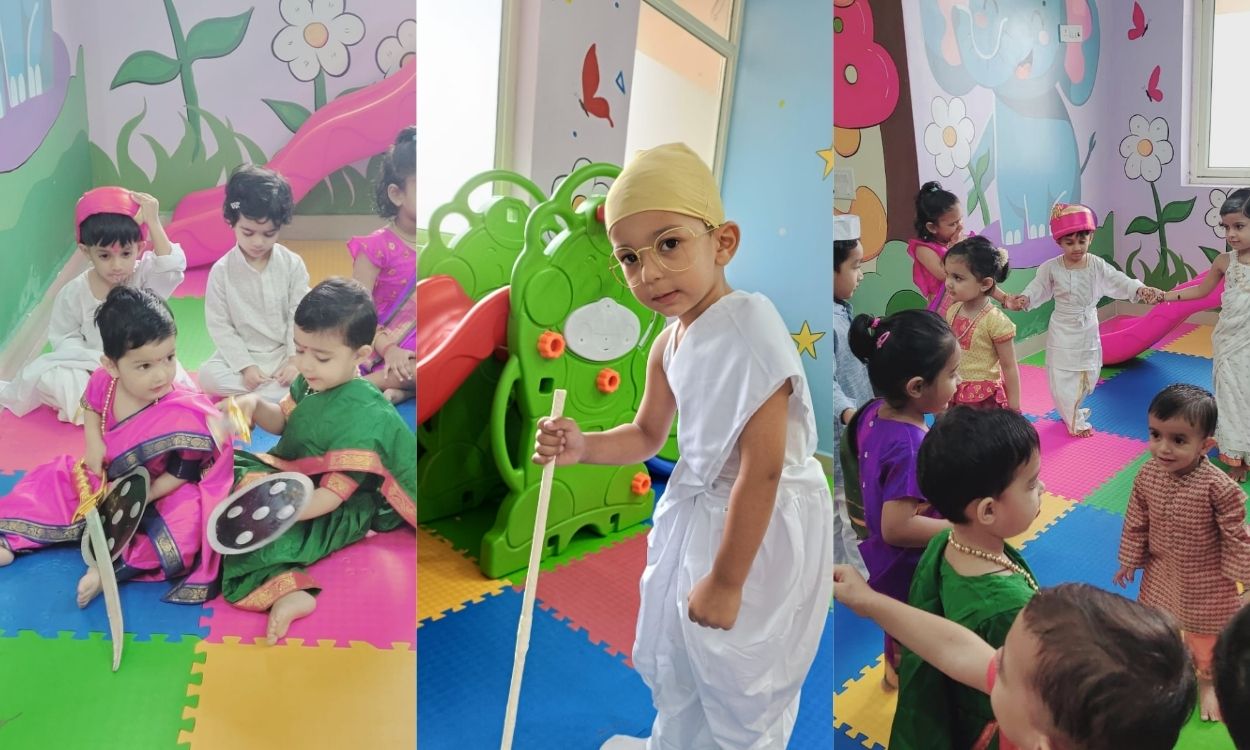Every parent dreams of giving their child the best start in life, and nursery admission is often the first big step in this journey. But how can you tell if your little one is ready to take on this milestone? It’s a mix of emotional, social, and cognitive readiness that determines if your child is ready for this exciting chapter. Let’s explore the five key signs that indicate your child is prepared to start nursery. 1. Curiosity and Eagerness to Learn One of the most telling signs that your child is ready for nursery is their natural curiosity about the world around them. Do they ask lots of questions like, “Why is the sky blue?” or “How does this toy work?” This eagerness to learn and discover new experiences strongly indicates that your child is prepared to thrive in a structured educational environment.. Nursery programs are designed to harness this curiosity through fun and interactive activities. Tip for Parents: Encourage your child’s curiosity by engaging in storytelling, playing educational games, or even visiting places like parks and libraries. These experiences build their excitement for school. 2. Ability to Socialize with Other Kids Social skills play a vital role in a successful nursery experience. If your child enjoys playing with other kids, sharing toys, or even just being around peers, it’s a good sign they’re ready. On the other hand, if they tend to stay shy or cling to you, gently introducing group playdates or activities can help ease their transition into a nursery setting. Tip for Parents: Arrange playdates or enroll your child in group activities like dance or art classes to nurture their ability to interact with others. 3. Basic Independence Nursery requires children to handle small tasks on their own, such as eating, washing their hands, or packing away toys. If your child is starting to show signs of independence in these areas, they’re likely ready for nursery admission. While teachers are always there to assist, a sense of self-sufficiency can boost their confidence and make the transition smoother. Tip for Parents: Practice simple routines at home, such as dressing themselves or tidying up their toys, to help them feel more prepared. 4. Ability to Follow Simple Instructions Another indication of readiness is when your child can comprehend and follow basic instructions.Tasks like “Please put your shoes on,” or “Bring your book here,” demonstrate that they can process information and act on it. This skill is crucial in a nursery environment where children are guided through activities and group interactions. Tip for Parents: Play fun games like Simon Says to improve their listening skills and ability to follow directions. 5. Comfort with Being Away from You Separation anxiety is common in young children, but if your child can spend short periods away from you without becoming overly distressed, it’s a strong indicator that they’re ready for nursery. Look for signs such as happily staying with grandparents, a babysitter, or even playing independently for some time. Tip for Parents: Gradually increase the time your child spends with trusted caregivers to build their confidence and prepare them for the nursery environment. Final Thoughts Deciding if your child is ready for nursery is a big decision, but these five signs can provide valuable guidance. Remember, every child develops at their own pace, and it’s perfectly okay to wait a little longer if you feel they need more time. The goal is to ensure that their nursery experience is positive and enjoyable, laying a strong foundation for future learning. Pro-Tip for Parents: Visit prospective nurseries with your child and observe their reactions. Sometimes, a simple tour can help you and your child feel more comfortable with this next step. Preparing for nursery is an exciting time for both you and your little one. Celebrate this milestone with confidence, knowing you’re making the best choice for their bright future! Don’t miss: 5 Reasons Parents in Gurgaon Prefer TechSix for Preschool Admission
What Are the Age Criteria for Nursery Admission in Gurgaon 2025?
Gurgaon, one of the leading educational hubs in NCR, offers numerous options for quality early childhood education. As the nursery admission process for the 2025-2026 academic year begins, many parents are eager to learn about the age criteria and the important deadlines involved. This post will guide you through the age criteria for nursery admissions in Gurgaon, along with crucial dates for the 2025-2026 admission process. 1. General Age Criteria for Nursery Admission in Gurgaon (2025) The age criteria for nursery admissions in Gurgaon for the academic year 2025-2026 are quite straightforward. Here are the key points to consider: Minimum Age: Children should be at least 3 years old by 31st March 2025. Maximum Age: The upper age limit for nursery admission is generally 4 years 6 months as of 31st March 2025. Therefore, for the 2025-2026 session, children born between 1st October 2020 and 31st March 2022 are eligible to apply for nursery. Example: If your child was born between 1st October 2020 and 31st March 2021, they are eligible for nursery admission in 2025. Children born before 1st October 2020 may not qualify for nursery but may be eligible for Kindergarten (KG). 2. What if My Child is Older or Younger? Older Children: If your child exceeds the upper age limit for nursery, they will not be eligible for admission to nursery and will likely need to apply for Kindergarten (KG). Younger Children: Children slightly under the required age may find it difficult to get admission to nursery as most schools in Gurgaon do not relax age limits. However, some schools may have a Pre-Nursery program for children between 2–3 years. 3. Important Admission Dates for Nursery in Gurgaon (2025) The nursery admission process in Gurgaon for the 2025-2026 academic session has already begun. Here are the key dates to keep in mind: Admission Process Begins: November 28, 2024 Last Date for Application Submission: December 20, 2024 Uploading Applicant Details: January 3, 2025 Uploading Marks Under the Points System: January 10, 2025 First List of Selected Candidates: January 17, 2025 Query Resolution for First List: January 18–27, 2025 Second List of Selected Candidates: February 3, 2025 Query Resolution for Second List: February 5–11, 2025 Admission Process Concludes: March 14, 2025 It is important to note these dates and submit your applications within the specified time frame to avoid missing out on your preferred school. 4. Are There Any Exceptions to the Age Criteria? Some schools in Gurgaon may offer flexibility in the age criteria, especially in cases of siblings or unique circumstances. Pre-Nursery Programs: Some schools offer a Pre-Nursery program for younger children, even those as young as 2 years old. Check with individual schools for availability and eligibility. Sibling Preferences: Many schools offer priority admission to siblings of current students, which may help in the admission process regardless of the child’s exact age. 5. What Documents Are Required for Age Verification? When applying for nursery admissions, parents need to provide the following documents for age verification: Birth Certificate: A government-issued birth certificate is required for verifying the child’s age. Other Documents: In some cases, the school may accept other documents such as a passport, Aadhaar card, or hospital records. Make sure the birth certificate is from a government-recognized authority to avoid delays in the admission process. 6. How to Determine if Your Child is Ready for Nursery? While age is a primary factor, it’s equally important to assess whether your child is ready for nursery school. Here are some signs to look for: Communication Skills: Your child should be able to express their needs and wants. Potty Training: Most schools prefer children to be toilet trained before joining the nursery. Separation Readiness: Your child should be comfortable staying away from you for a few hours. Social Skills: An interest in playing and interacting with peers is important for a smooth transition to nursery. 7. Tips for Parents Applying for Nursery Admissions in Gurgaon Start Early: Begin researching schools as early as possible, preferably by October 2024, to stay ahead in the competitive admissions process. Track Admission Dates: Keep an eye on important dates such as the submission deadline and the release of selected candidate lists. School Visits: Once you have shortlisted schools, visit them to learn about their curriculum, teaching methods, and facilities. Prepare Your Child: Help your child adjust to the idea of school by engaging them in educational activities and setting a routine. Wrapping Up With the admission process starting on November 28, 2024, parents must be aware of the age criteria and the important deadlines for nursery admission in Gurgaon. Children aged 3 to 4.5 years by March 31, 2025, are eligible for nursery admission, and you should ensure that all documents are in place for a smooth application process. By staying informed and planning, you can ensure a successful admission for your child and provide them with the best start in their educational journey. Best of luck with the nursery admission process in Gurgaon! Preschool Admissions are now open for the 2025-26 Academic Session! – Enroll Your Kid Now! Don’t miss: Top 10 Benefits of Montessori Education for Your Kid
How Preschool Helps Prepare Your Child for Kindergarten?
Enrolling your child in preschool is an important step that lays the groundwork for future academic success, social growth, and independence. While kindergarten is often seen as the start of formal education, preschool plays a vital role in preparing children for this transition. From learning basic skills to developing confidence, here’s a look at how preschool helps prepare your child for kindergarten. 1. Encourages Early Social Skills One of the most significant benefits of preschool is socialization. In preschool, children interact with peers, teachers, and other adults in a safe environment. These interactions teach them to share, communicate, listen, and empathize, helping them develop social skills that are essential for group learning in kindergarten. 2. Promotes Independence and Self-Care Preschool encourages children to perform simple self-care tasks independently, such as washing hands, packing their belongings, and even serving themselves snacks. Learning these routines builds confidence, independence, and a sense of responsibility—all of which are crucial for kindergarten readiness. 3. Develops Fine and Gross Motor Skills Preschool activities are designed to promote both fine and gross motor skills. Whether it’s using scissors, stacking blocks, painting, or playing on the playground, these tasks help children develop coordination, strength, and control, which are essential for writing, cutting, and other skills needed in kindergarten. 4. Introduces Basic Academic Concepts Preschool introduces foundational academic skills in a fun and engaging way. Children are exposed to numbers, letters, shapes, and colours, setting the stage for literacy and math skills. Simple activities like counting objects or singing the alphabet help build a love for learning and ease them into the structure of academic instruction. 5. Builds Attention Span and Focus Activities in preschool are designed to gradually build children’s ability to focus and follow instructions. Through storytime, art projects, and group tasks, children learn to concentrate for extended periods, follow directions, and complete tasks, all of which are critical skills they will need in kindergarten. 6. Encourages Creativity and Curiosity Preschool fosters a child’s natural curiosity and creativity. Children are encouraged to ask questions, explore their surroundings, and engage in imaginative play. This open-ended approach to learning not only nurtures a sense of wonder but also helps children develop problem-solving skills, critical thinking, and a positive attitude toward new experiences. 7. Teaches Conflict Resolution and Emotional Awareness In preschool, children learn to express their feelings, manage emotions, and resolve conflicts with peers. Teachers guide them in identifying emotions and using words to express themselves rather than physical actions. These skills are essential for emotional maturity, helping them handle the social dynamics they will encounter in kindergarten. 8. Establishes a Routine and Structured Learning Preschool helps children get used to a routine and structured learning environment. From circle time to snack breaks, the schedule of a preschool day gives children a sense of predictability and security. This familiarity with routines prepares them for the more structured setting of kindergarten, where following a schedule is essential. 9. Boosts Confidence and Self-Esteem As children accomplish tasks, participate in group activities, and make new friends, they gain confidence in their abilities. Preschool allows children to take small risks in a supportive environment, which builds their self-esteem and prepares them to approach kindergarten with enthusiasm and assurance. 10. Prepares Parents for the Kindergarten Transition Preschool isn’t just beneficial for children; it also prepares parents for the school journey ahead. Through regular communication with teachers, parents get insights into their child’s strengths and areas for improvement. They also become accustomed to the structure and demands of the school environment, allowing for a smoother transition into kindergarten. Why Preschool is Key to Kindergarten Success? Kindergarten readiness isn’t solely about academics—it’s about developing the whole child. Preschool prepares children for kindergarten by nurturing social, emotional, and cognitive skills in a balanced, supportive environment. These early experiences help children enter kindergarten with the skills, confidence, and curiosity needed to thrive. TechSix – Preschool & Daycare Excellence TechSix stands out as the best preschool in Gurgaon, offering a nurturing and engaging environment where children thrive in their early years. With a Montessori-based approach, TechSix focuses on hands-on learning that encourages creativity, independence, and social skills. Our experienced educators are dedicated to fostering each child’s unique growth through structured activities and free play. If you’re looking for a preschool in Gurgaon that prioritizes holistic development and joyful learning, TechSix is the ideal choice for your child’s first educational journey. Final Thoughts Preschool offers a gentle, effective introduction to the world of structured learning. By supporting a child’s early development in social, academic, and emotional skills, preschool lays a strong foundation for future academic success. As you consider options for your child’s early education, remember that a good preschool experience can make all the difference in preparing them for the exciting world of kindergarten and beyond. Related:- 8 Benefits of Montessori-Based Preschool Education
10 Daycare Safety Standards Every Parent Should Know
When it comes to choosing a daycare for your child, safety is the top priority. As parents, you want to ensure that your little one is in a secure, caring environment while you’re away. Daycare centers are responsible for creating a safe space where children can thrive, but it’s important to know what standards and practices are in place to guarantee this safety. 10 Must-Know Daycare Safety Standards for Parents Here’s a guide to the key daycare safety standards every parent should know. 1. Cleanliness and Hygiene A clean environment is crucial for the health and well-being of your child. Make sure the daycare follows strict hygiene protocols, such as: Regular cleaning of toys, furniture, and common areas. Frequent hand washing for both children and staff. Sanitation practices for meal areas and bathrooms. A daycare should have clear procedures in place for cleaning and maintaining a healthy environment to prevent the spread of germs and illnesses. 2. Staff-to-Child Ratio The staff-to-child ratio is one of the most important factors in ensuring that your child receives the attention and care they deserve. A high staff-to-child ratio allows caregivers to closely supervise each child, provide individualized attention, and quickly address any potential issues. For infants and toddlers, an ideal staff-to-child ratio is smaller, such as 1:3 or 1:4. For older children, a ratio of 1:6 or 1:8 is acceptable depending on the daycare’s guidelines. A lower ratio ensures that each child is supervised and their needs are met. 3. Background Checks for Staff Daycare staff should undergo comprehensive background checks before being hired. This includes checking for criminal records, child abuse, or neglect. Knowing that caregivers have been thoroughly vetted gives parents peace of mind and ensures that their child is being cared for by trustworthy professionals. 4. First Aid and CPR Training Daycare staff must be trained in first aid and CPR. Accidents can happen, especially with young children, so staff should be prepared to handle emergencies. Ask the daycare about the training their employees undergo and ensure that there is at least one certified first-aid responder present at all times. Additionally, make sure that the daycare has a well-stocked first-aid kit and a plan in place for medical emergencies. 5. Safe Sleep Practices For infants, sleep safety is critical. Daycare centers should follow safe sleep guidelines to reduce the risk of sudden infant death syndrome (SIDS). These include: Placing babies on their backs to sleep. Avoiding soft bedding, pillows, or blankets in cribs. Keeping cribs away from potential hazards like cords or heavy objects. If your child is an infant, make sure the daycare follows these guidelines and ensures a safe and comfortable nap environment. 6. Secure Environment The daycare environment should be childproofed and free from hazards. This includes: Safety gates to block off stairs. Electrical outlets covered to prevent shock. Sharp objects and hazardous materials should be kept out of reach. Windows and doors secured to prevent children from wandering off. A well-secured daycare ensures that children are safe from physical injury and prevents accidents from occurring. 7. Emergency Procedures and Evacuation Plans Every daycare center should have clear emergency procedures in place, including: Fire drills and evacuation plans. Protocols for managing natural disasters or other emergencies. A designated safe area for children to assemble during emergencies. Ask the daycare about their emergency protocols and ensure that they regularly practice evacuation drills so that staff and children know exactly what to do in case of an emergency. 8. Childproofing the Playground If your daycare has an outdoor play area, it’s essential that it’s childproofed and safe for use. Look for: Soft, cushioned surfaces under play equipment. Age-appropriate toys and equipment. Regular inspection of playground equipment for damage or wear. Playgrounds should be regularly maintained and meet safety standards to minimize the risk of injury during playtime. 9. Clear Communication with Parents Daycare centers should maintain open communication with parents about safety concerns. This can include: Regular updates on safety practices and any changes in policies. Notifications about accidents or injuries (even minor ones). Procedures for reporting and addressing safety concerns. Establishing a line of communication ensures that both the daycare and parents are on the same page when it comes to safety standards. 10. Proper Nutrition and Food Safety For daycare centers that provide meals and snacks, food safety is paramount. Ensure that the daycare adheres to proper food storage and preparation guidelines to prevent foodborne illnesses. Additionally, inquire about the daycare’s policy on food allergies, as staff must be trained to manage allergy-related emergencies and have knowledge of safe food handling practices. TechSix – Preschool & Daycare Excellence TechSix is the best daycare in Gurgaon, dedicated to providing a secure and enriching environment for your child. Our trained caregivers prioritize safety, emotional well-being, and early development. With a focus on both structured and creative activities, TechSix ensures your child grows in a nurturing and fun-filled atmosphere. Safe and secure environment with regular supervision Age-appropriate activities promoting learning and creativity Trained and caring staff for individualized attention Focus on emotional, social, and cognitive development At TechSix, we give your child the best care, preparing them for a bright future. Final Thoughts When selecting a daycare, don’t just look at the educational curriculum or activities—focus on safety standards too. A safe daycare environment ensures that your child is not only learning but also protected from potential risks. By asking the right questions and observing the daycare’s practices, you can rest assured that your little one is in good hands. After all, peace of mind is just as important as your child’s education when it comes to daycare. Don’t Miss: How Preschool Helps Prepare Your Child for Kindergarten
10 Best Daycare Centers in Gurgaon Every Parent Should Know About
Finding the right daycare center for your child is one of the most important decisions you will make as a parent. You want a place where your child will feel safe, loved, and engaged in activities that promote their overall development. Gurgaon, being a hub for families and working professionals, offers a wide range of daycare centers that cater to the needs of children while ensuring peace of mind for parents. In this blog, we’ve compiled a list of the best daycare centers in Gurgaon that every parent should know about. Updated List of Top 10 Daycare Centers in Gurgaon 1. TechSix – Preschool & Daycare TechSix Preschool & Daycare provides an environment where children learn through exploration and play. The best day care in Gurgaon focuses on helping children develop socially, emotionally, and academically. They offer a variety of programs that are designed to suit different age groups, from toddlers to preschoolers. The curriculum encourages creativity, teamwork, and problem-solving through hands-on activities, making learning fun and engaging. Address: Block A, Suncity Avenue 76, Sector 76, Gurugram, Haryana 122004 Phone: +91 086986 90097 Website: www.techsix.in 2. Kangaroo Kids Kangaroo Kids provides a warm, engaging environment that fosters holistic child development. With an interactive curriculum, it encourages creativity, critical thinking, and emotional intelligence, empowering children to explore, learn, and grow. The focus on overall development nurtures confident, curious, and well-rounded individuals prepared for future challenges. Address: CHINTELS PARADISO, Sector 109, Gurugram, Haryana 122017 Phone: +91 098103 95535 Website: www.kangarookids.in 3. Bachpan Play School Bachpan Play School follows a child-centric approach, prioritizing the physical, mental, and social development of toddlers. Its nurturing environment ensures children grow in a safe and supportive space. With multiple branches across Gurgaon, Bachpan provides convenient, high-quality daycare services, making it an ideal choice for working parents seeking the best care for their little ones. Address: Plot no – 1157, Sector 46, Service lane, Gurugram, India, Haryana Phone: +91 124 403 1590 Website: www.bachpanglobal.com 4. The Learning Tree The Learning Tree offers a stimulating and secure environment for young children, combining academic learning with creative activities like art and music. Their curriculum is designed to foster intellectual curiosity, creativity, and critical thinking. With a focus on holistic development, The Learning Tree ensures that children grow emotionally, socially, and academically in a fun, engaging setting. Address: Nahar Pur Rupa, Sector 33, Gurugram, Haryana 122001 Phone: +91 85889 20726 Website: www.thelearningtree.in 5. Kidzee Kidzee, one of India’s largest preschool chains, offers an innovative, research-based curriculum. Their daycare program focuses on developing children’s cognitive, emotional, and social skills through interactive and engaging activities. With a child-centric approach, Kidzee provides a fun, stimulating environment that nurtures young minds and ensures holistic development, preparing them for future academic and social success. Address: Sector 56 and DLF Phase 5 Phone: +91 93200 63100 Website: www.kidzeegurgaon.com 6. Hello Kids Hello Kids offers a well-rounded daycare experience, emphasizing creative learning, group activities, and social interaction. Their facilities are designed to foster exploration and growth, while the dedicated staff ensures a fun and safe environment for children. With a focus on holistic development, Hello Kids helps nurture creativity, social skills, and cognitive growth in young children. Address: Building no 324, Sheetla Enclave, Lane no 7B,, Sector 5, Gurugram, Haryana 122001 Phone: +91 6364048738 Website: www.hellokids.co.in 7. Anandam Play School & Day Care Anandam Play School & Day Care provides a nurturing, play-based learning environment that emphasizes cognitive and emotional development. Their curriculum promotes creativity, social skills, and independence. The dedicated staff offers personalized care in a safe, clean space, ensuring children have the freedom to grow, explore, and develop in a supportive and engaging setting. Address: Plot no. 217, Sector 1, Imt Manesar, Gurugram, Haryana 122051 Phone: +91 099995 64877 8. EuroKids EuroKids is a prominent daycare center known for its balanced approach to early childhood education. They integrate structured learning with play and creativity to ensure that children develop essential cognitive, emotional, and social skills. EuroKids focuses on providing a nurturing environment where children can explore, learn, and grow. Their curriculum lays a strong foundation for future academic success while fostering creativity and curiosity in a fun, engaging setting. Address: 880, Sector 21 Rd, Sector 21, Gurugram, Haryana 122022 Phone: +91 78279 96679 Website: www.eurokidsindia.com 9. Mother’s Pride Gurgaon 40 Mother’s Pride Mother’s Pride is one of the most renowned daycare and preschool chains in India, offering top-tier childcare and early education services. Known for its child-centric curriculum, Mother’s Pride focuses on developing the overall personality of children through a balance of play, learning, and exploration. Their approach to early childhood education includes activities designed to enhance creativity, communication, motor skills, and emotional intelligence Address: Block-G PS.2, opposite Community Centre, Sector 40, Gurugram, Haryana 122022 Phone: +91 085869 84520 Website: www.motherspridepreschool.com 10. TINY TOTS Tiny Tots offers a caring and secure environment for infants and toddlers. Their curriculum is designed to stimulate children’s curiosity and cognitive skills through sensory activities, storytelling, and creative play. Address: A-14/1, Golf Course Rd, DLF Phase 1, Sector 26, Gurugram, Haryana 122002 Phone: +91 0124 407 9630 Website: www.tinytots.in These top daycare centers in Gurgaon provide not only quality childcare but also an enriching learning environment that ensures your child’s early development in a secure and supportive space. Each of these centers offers a unique approach, allowing parents to find the perfect fit for their little ones. Wrapping Up Each daycare center offers something unique, whether it’s a focus on holistic development, engaging activities, or a warm, home-like atmosphere. Choosing the right one means finding the perfect balance between your child’s needs and your family’s priorities. With these carefully selected daycare centers in Gurgaon, you’ll provide a safe and nurturing environment that fosters your child’s growth, happiness, and confidence, ensuring a bright start to their journey. Don’t miss: 10 Best Preschools in Gurgaon for Your Little Ones’ First Learning Steps
Top 10 Questions to Ask During a Preschool Visit
Choosing the right preschool is a crucial step in your child’s early education journey, and visiting potential preschools is an excellent way to get a feel for each one. During these visits, asking the right questions can help you determine which environment aligns best with your child’s needs and your expectations. Here are the top 10 questions to ask during the preschool visit to help you make a confident choice. Q1. What is the Preschool’s Teaching Philosophy? Start by understanding the school’s teaching approach. Is it Montessori, play-based, or more traditional? Knowing this will help you decide if it aligns with your child’s learning style and your educational values. Q2. What Does a Typical Day Look Like? Ask about the daily schedule to understand how time is allocated between structured activities, free play, and rest. This gives insight into how the preschool balances learning with fun and whether the routine would suit your child’s temperament and needs. Q3. How Qualified are the Teachers and Staff? Teacher qualifications are key to a quality preschool experience. Inquire about the teachers’ credentials, their experience in early childhood education, and if they undergo regular training. The right staff will know how to handle both educational and emotional needs. Q4. What is the Student-to-Teacher Ratio? The student-to-teacher ratio can impact the amount of attention your child receives. Lower ratios typically mean more individualized care, making it important to understand how many teachers will be available for each group of children. Q5. How Does the Preschool Handle Discipline and Conflict Resolution? It’s essential to know the preschool’s approach to discipline and conflict. Do they use positive reinforcement, redirection, or other methods? Understanding this will let you know if their strategies align with the values you uphold at home. Q6. How Does the Preschool Communicate with Parents? Find out how the preschool keeps parents informed about their child’s progress and daily activities. Do they offer regular updates, photos, or report cards? Strong communication helps you stay connected and address any issues promptly. Q7. What Safety and Health Measures Are in Place? Safety is paramount, so ask about their procedures for keeping children secure and healthy. Inquire about emergency preparedness, cleanliness standards, and the school’s approach to handling illnesses. These precautions indicate how seriously the school takes your child’s well-being. Q8. Are Meals and Snacks Provided, and What is the Policy on Allergies? Nutrition is important, so ask if meals or snacks are included and if the school is mindful of dietary needs. If your child has food allergies, ensure that there are protocols in place to prevent exposure. Q9. What Kinds of Activities and Materials Are Used to Support Learning? Ask about the types of activities, toys, and materials that children interact with. Seek out materials that promote creativity, problem-solving, and the development of motor skills. This will help you understand how the preschool fosters hands-on learning and intellectual growth. Q10. How Does the Preschool Prepare Children for Kindergarten and Beyond? Ask about the preschool’s approach to school readiness. What skills and knowledge do they aim to develop in children to ensure a smooth transition to kindergarten? A strong preschool program will focus not only on academics but also on social skills and emotional readiness. Other Important Considerations Visiting the preschool in person also allows you to observe the classrooms, check the facilities, and get a feel for the environment. Additionally, notice how staff interact with children. Do they seem attentive, warm, and patient? Trust your instincts on whether the preschool feels like a good fit for your family.4 TechSix TechSix is Gurgaon’s leading play school, dedicated to fostering young minds through a balanced approach of play and learning. Our Montessori-inspired environment encourages curiosity, creativity, and social skills in a safe, nurturing space. With experienced teachers and a structured, play-based curriculum, TechSix ensures each child’s growth in both academics and emotional well-being. Choose TechSix for a holistic, supportive start to your child’s educational journey, right here in Gurgaon. Final Thoughts Asking these questions can help you gain a well-rounded understanding of each preschool and make an informed decision. Remember, the right preschool will offer a safe, nurturing environment where your child can learn, play, and grow with confidence. Happy searching! Don’t Miss: 5 Benefits of Play-Based Learning for Early Childhood Development
Top 10 Benefits of Montessori Education for Your Kid
Montessori education is a globally recognized teaching method that focuses on the holistic development of children. Designed by Dr. Maria Montessori, this educational philosophy encourages independence, creativity, and intrinsic motivation, laying a strong foundation for lifelong success. If you’re considering Montessori education for your child, here are the top 10 benefits of Montessori education explained in detail to help you make an informed decision. 10 Benefits of Montessori Education You Need to Know 1. Encourages Independence Montessori education is rooted in the idea of fostering independence. Classrooms are designed to allow children to make their own choices, manage tasks, and take ownership of their learning. Children are encouraged to complete tasks independently. Develops confidence, decision-making, and problem-solving skills. This approach helps children build self-reliance and autonomy, crucial traits for their academic and personal development. From choosing activities to completing daily responsibilities, Montessori students learn to trust their abilities. 2. Individualized Learning Unlike traditional education systems, Montessori schools focus on personalized learning. Each child’s unique strengths, learning pace, and interests are respected and nurtured. Lessons are tailored to suit each child’s needs. Reduces pressure by eliminating unnecessary competition. Teachers observe students closely and create customized plans to ensure that every child progresses without feeling overwhelmed. This tailored approach not only boosts academic performance but also fosters confidence and self-esteem. 3. Hands-On Learning Montessori classrooms are filled with hands-on learning materials that make abstract concepts tangible and easier to understand. These tools are carefully designed to engage children in interactive activities. Learning materials encourage exploration and experimentation. Helps children understand complex concepts through practical application. For example, Montessori materials like counting beads, sensory boards, and puzzles stimulate curiosity and make learning a joyful experience. By actively engaging with these tools, children develop a deeper understanding of concepts. 4. Develops Critical Thinking Montessori education is designed to nurture critical thinking and problem-solving skills. Children are encouraged to ask questions, analyse situations, and come up with solutions independently. Promotes curiosity, exploration, and independent discovery. Teaches children to approach challenges creatively and confidently. This method prepares children to think critically and tackle real-world problems. Montessori education encourages children to explore and learn at their own pace, helping them develop a mindset of creativity and resilience. 5. Enhances Social Skills A unique feature of Montessori classrooms is the presence of mixed-age groups. Younger children learn by watching their older peers, while older children strengthen their leadership and mentoring abilities by helping younger classmates. Mixed-age classrooms encourage teamwork and cooperation. Teaches empathy, respect, and effective communication. This collaborative environment helps children build strong social skills, including empathy and teamwork, which are essential for success in personal and professional life. 6. Fosters a Love for Learning Montessori education focuses on intrinsic motivation, meaning children are driven by their natural curiosity rather than external rewards or punishments. This instills a lifelong love for learning. Encourages children to explore topics they’re passionate about. Removes the pressure of grades and external rewards. By allowing children to choose their activities based on their interests, Montessori education makes learning an enjoyable and fulfilling experience. This enthusiasm for learning frequently extends far beyond the classroom. 7. Respects Individuality Montessori education respects and fosters the unique individuality of every child. It focuses on nurturing their unique strengths, interests, and personality traits, which fosters self-esteem and emotional well-being. Recognizes each child’s unique traits and talents. Encourages self-expression and emotional growth. When children feel valued and respected, they are more likely to develop a positive self-image and the confidence needed to face challenges head-on. 8. Teaches Practical Life Skills Montessori education integrates practical life activities, such as cooking, cleaning, and organizing, into the curriculum. These tasks not only teach essential life skills but also help children develop a sense of responsibility. Everyday tasks like tying shoelaces or pouring water are part of the curriculum. Improves fine motor skills and independence. Through these activities, children learn to take care of themselves and their surroundings, preparing them for real-world responsibilities. 9. Promotes Peaceful Behavior Montessori education emphasizes respect, kindness, and conflict resolution. Children are taught to manage their emotions and resolve disputes in a peaceful manner. Teaches children how to handle conflicts calmly and respectfully. Creates a harmonious and cooperative classroom environment. By fostering a sense of empathy and understanding, Montessori education helps children develop strong interpersonal skills that will benefit them throughout life. 10. Prepares for Lifelong Success Montessori education provides children with the essential skills required to thrive in the modern world. By fostering adaptability, resilience, and curiosity, it lays the groundwork for both academic and personal achievements. Builds traits like adaptability, resilience, and curiosity. Prepares children for academic and professional success. The emphasis on critical thinking, independence, and self-discipline ensures that Montessori students are well-prepared to face challenges and thrive in their future endeavors. TechSix – Preschool & Daycare Excellence TechSix stands out as the best Montessori based preschool in Gurgaon, offering a nurturing environment where children thrive academically, socially, and emotionally. With a focus on hands-on learning, personalized attention, and play-based development, TechSix ensures holistic growth for every child. Their state-of-the-art facilities, experienced educators, and innovative curriculum create the perfect foundation for lifelong learning. Trust TechSix to shape your child’s early years with care, creativity, and excellence. Wrapping Up Montessori education takes a holistic approach to learning, focusing on more than just academics. It nurtures independence, creativity, and social skills, shaping children into confident and capable individuals. Whether it’s their focus on hands-on learning or respect for individuality, Montessori schools provide an environment where children can truly thrive. If you’re seeking a well-rounded education that fosters lifelong success, Montessori is an excellent choice for your child. What are your thoughts on Montessori education? Share your views in the comments below! Don’t miss:- 10 Best Preschools in Gurgaon for Your Little Ones’ First Learning Steps
Choosing the Right Preschool: What Every Parent Should Know
Choosing the right preschool is a crucial decision for every parent. It sets the foundation for a child’s lifelong love of learning, social development, and even their first friendships. The process can feel overwhelming, with numerous factors to consider. To help ease the journey, here’s a comprehensive guide on what every parent should know when choosing the perfect preschool for their little one. 1. Understand Your Child’s Needs and Interests Every child is unique, and preschool should cater to their personality, learning style, and developmental needs. Is your child very social or more reserved? Do they have specific interests, such as music or nature? Recognising these traits can guide you towards a preschool that will foster their strengths and help them grow in areas where they may need a little more support. 2. Research Different Preschool Philosophies Preschools often follow distinct educational philosophies, and understanding these can help you choose one that resonates with your goals for your child. Here’s a quick overview: Montessori: Emphasises independence and hands-on learning. Children progress at their own pace by engaging in self-guided activities. Reggio Emilia: Focuses on project-based learning in a supportive environment where children’s interests drive the curriculum. Waldorf: Encourages creativity, imagination, and an experiential approach to learning. Play-Based or Traditional: Prioritises socialisation and play as the primary mode of learning, allowing children to explore and interact freely. Each of these approaches offers unique benefits, so choose one that aligns best with your expectations and your child’s needs. 3. Evaluate the Curriculum and Learning Environment The curriculum should strike a balance between academics and play-based activities. A quality preschool curriculum will engage children in age-appropriate learning while making space for fun and creativity. Look for a well-rounded program that includes early literacy, numeracy, music, art, and physical activities. Visiting the preschool and observing classes can give you insight into the learning environment. It should be bright, welcoming, and child-friendly, with plenty of space for exploration. You might also want to see how teachers interact with children—whether they’re nurturing, encouraging, and attentive to each child’s needs. 4. Consider Class Size and Teacher-to-Student Ratio Smaller class sizes and a low teacher-to-student ratio are often indicators of high-quality care. With fewer children to attend to, teachers can focus more on each child’s development and offer individualised attention. Generally, an ideal ratio for a preschool setting is around 1 teacher for every 8-10 children. This ensures that your child won’t be lost in the crowd and can form close bonds with both teachers and peers. 5. Observe Health and Safety Standards Safety is non-negotiable in any preschool environment. Check that the school has proper security measures, such as secure entryways, strict drop-off and pick-up protocols, and well-maintained classrooms and play areas. Additionally, cleanliness and hygiene should be a priority. Preschoolers can easily pick up germs, so look for signs of regular sanitisation and procedures to manage health concerns, especially in common areas and restrooms. 6. Look into Teacher Qualifications and Training Qualified, trained, and enthusiastic teachers make a world of difference in your child’s early learning experience. Find out about the teachers’ educational backgrounds, certifications, and experience in early childhood education. Teachers who regularly engage in professional development and training are better equipped to provide a dynamic and supportive learning environment. 7. Assess Communication and Parent Involvement An ideal preschool will maintain open lines of communication with parents, keeping you informed of your child’s progress, school events, and any important updates. Ask about the frequency and methods of communication, whether through weekly newsletters, parent-teacher meetings, or online platforms. Many preschools also encourage parental involvement, allowing you to participate in activities or volunteer in classrooms. This can be a great way to feel connected to your child’s school experience and witness their growth firsthand. 8. Review Policies on Discipline and Conflict Resolution Every preschool has its approach to discipline and handling conflicts among children. It’s important to understand these policies to ensure they align with your parenting style. Look for positive reinforcement strategies that focus on teaching rather than punishment. For instance, many quality preschools use conflict resolution techniques that encourage children to communicate their feelings and understand others’ perspectives. 9. Explore Extracurricular Activities Many preschools offer extracurricular activities like music, dance, sports, or language learning. While not essential, these activities can provide additional outlets for creativity, physical development, and social interaction. If your child shows an interest in a particular activity, ask whether the preschool offers a program or classes in that area. 10. Trust Your Instincts Ultimately, trust your instincts when choosing a preschool. Sometimes, you can feel immediately comfortable in a school, sensing it as the right fit for your child. If something doesn’t feel right, take it as a sign to keep exploring other options. Remember, you know your child best, and your intuition is a valuable tool in this journey. TechSix TechSix stands out as Gurgaon’s best preschool, offering a nurturing, safe, and engaging environment for early learning. Guided by Montessori principles, TechSix combines structured academics with play-based activities, ensuring a holistic development approach. Our experienced teachers foster curiosity, social skills, and confidence, setting the foundation for lifelong learning. Why Choose TechSix? Montessori-Based Learning: Encourages independent exploration. Experienced Teachers: Skilled in early childhood education. Safe, Child-Friendly Environment: Prioritizes safety and hygiene. Play-Based Curriculum: Balances learning with creativity. Parental Involvement: Regular updates and engagement opportunities. At TechSix, every child blossoms, building essential skills for future success. Final Thoughts Selecting the right preschool is a meaningful milestone for both you and your child. It’s more than just academics—it’s about nurturing their natural curiosity, encouraging social skills, and building a foundation of confidence and joy in learning. Take the time to explore, ask questions, and evaluate options based on the aspects above. When you find the right preschool, you’ll know you’ve set your child on the path to a fulfilling educational journey, and you can rest assured that their early learning experiences will be safe, joyful, and enriching. Don’t Miss: Benefits of a Structured Routine
10 Best Preschools in Gurgaon for Your Little Ones’ First Learning Steps
Choosing the best preschool in Gurgaon can be a challenge with so many excellent options. From nurturing daycares to Montessori-based programs, Gurgaon offers preschools that cater to every child’s unique developmental needs. This guide explores ten outstanding preschools, each offering a blend of academics, play, and cultural values to prepare your little ones for the future. Let’s dive into what makes these schools exceptional choices for your child’s first steps in learning. Updated List of Top 10 Preschools in Gurgaon 1. TechSix – Preschool & Daycare TechSix in Gurugram offers a nurturing, Montessori-inspired environment tailored for children aged 2 to 6. Emphasizing holistic development, the preschool utilizes a play-based curriculum that encourages learning through exploration and creativity. With a team of experienced educators and innovative educational tools, TechSix fosters intellectual, social, and emotional growth, equipping children with essential skills for a successful future. Parent Tip: With both preschool and daycare services, TechSix is a perfect choice for working parents looking for all-day care. Contact Details Address: Block A, Suncity Avenue 76, Sector 76, Gurugram, Haryana 122004 Phone: 086986 90097 Website: www.techsix.in 2. Pathways Early Years Pathways Early Years provides a holistic, interactive learning environment where young children can thrive. With a strong emphasis on co-curricular activities and social skill-building, this preschool is dedicated to laying a solid foundation for lifelong learning, ensuring children develop essential skills while enjoying a nurturing and engaging atmosphere. Parent Tip: Pathways provides a warm and engaging space, ideal for social growth and confidence-building in your child. Contact Details Address: Golf Course Rd, Huda, Sushant Lok 2, Sector 55, Gurugram, Haryana 122011 Phone: +91 9599002060 Website: www.pathwaysgk.com 3. KLAY, Sector 65 Gurgaon KLAY provides spacious classrooms and age-appropriate learning zones, featuring a curriculum rooted in international standards, including STEAM and project-based learning. With over 13 years of experience, KLAY adopts a child-centric approach that prioritizes holistic development, ensuring each child flourishes academically, socially, and emotionally in a supportive environment. Parent Tip: Daily updates and live CCTV access allow parents to stay connected with their child’s day, adding an extra layer of comfort and safety. Contact Details Address: Nursery School, Site 1, Emerald Hills Rd, Sector 65, Gurugram, Haryana 122101 Phone: +91 7676708888 Website: www.klay.co.in 4. Shikshantar Shikshantar is a progressive school dedicated to fostering self-discovery and experiential learning while respecting each child’s individuality. This nurturing environment encourages children to explore their curiosity freely, promoting personal growth and confidence. With a focus on collaboration and creativity, Shikshantar inspires young minds to thrive and develop their unique talents. Parent Tip: Shikshantar’s child-centered approach is ideal for families who value creative expression and a unique learning experience. Contact Details Address: Block J, South City I, Sector 41, Gurugram, Haryana 122001 Phone: 0124-4889100 Website: www.shikshantarschool.com 5. Footprints Education Play School Footprints emphasize language and concept-based learning through engaging creative projects, equipping children with essential tools to enhance their language skills and foundational knowledge. This approach fosters a love for learning and encourages exploration, helping young minds develop critical thinking abilities while making education enjoyable and interactive for every child. Parent Tip: With multiple locations across Gurgaon, Footprints offers convenience for families seeking an enriching preschool close to home. Contact Details Address: B-28, Old DLF, Sector 14, Behind Aimfit Gym, Gurgaon, Haryana – 122001 Phone: +91 8010055055 Website: www.footprintseducation.in 6. Modern Montessori International (MMI) MMI excels in Montessori education, seamlessly integrating preschool, daycare, and teacher training to cultivate a balanced and structured environment. This holistic approach nurtures young minds, fostering independence, creativity, and a love for learning. By prioritizing each child’s unique development, MMI ensures a solid foundation for their educational journey ahead. Parent Tip: MMI’s organized and calm setting is particularly beneficial for children adjusting to routine, making it a great start for structured learning. Contact Details Address: 1113, Block E, DLF Phase 1, Sector 26, Gurugram, Haryana 122002 Phone: 0124-4382027 Website: www.modernmontessoriindia.com 7. SIS Play SIS Play harmoniously combines academics with a profound connection to human values, culture, and tradition. This unique approach fosters a sense of rootedness while embracing modern learning methodologies. By nurturing both the mind and the spirit, SIS Play prepares children to thrive academically and develop a strong sense of identity and community. Parent Tip: This is an ideal choice for parents who want their children to grow up with an appreciation for Indian culture and values. Contact Details Address: Hamilton Court Road, Sushant Lok Phase I, DLF Phase IV, Sector 43, Gurugram, Haryana 122002 Phone: 9871361100 Website: sisplay.in 8. Leens Nestling Leens Nestling is dedicated to addressing diverse developmental needs, nurturing motor skills in a cozy and supportive environment. Their thoughtfully designed curriculum promotes social, physical, and intellectual growth, ensuring that every child receives personalized attention. This holistic approach allows children to thrive and develop confidence as they explore and learn in a caring atmosphere. Parent Tip: If a warm, homely atmosphere is important to you, Leens Nestling offers a caring space where children feel comfortable and engaged. Contact Details Address: Gate no 16, B-Block, Site IV, Suncity, Sector 54, Gurugram, Haryana 122003 Phone: 0124-2578571 Website: leensnestling.com 9. The Shri Ram Early Years (TSEY) The Shri Ram Early Years (TSEY) carries forward the esteemed legacy of The Shri Ram Schools by providing value-based learning that establishes a robust foundation for formal education. With a focus on character development and academic readiness, TSEY prepares young learners to transition confidently into their educational journey while instilling core values and a love for learning. Parent Tip: The Shri Ram Early Years is perfect for families who value traditional values and academic excellence, providing a balanced start to education. Contact Details Address: Sohna – Gurgaon Rd, behind VIPUL GREENS, Sector 48, Gurugram, Haryana 122018 Phone: 8882676553 Website: www.tsey.in 10. Vidya Vana Vidya Vana is a thoughtfully designed preschool that places curiosity and joy at the heart of the learning experience. In this engaging and vibrant setting, children are encouraged to explore and discover, fostering a natural love for learning. The joyful atmosphere stimulates creativity and imagination, ensuring
Gandhi Jayanti Celebrations at TechSix – 2nd October 2024
Today (2nd October 2024), TechSix Preschool and Daycare observed Gandhi Jayanti with deep respect and reverence. The school was decorated with images of Mahatma Gandhi, and the air was filled with a spirit of peace and non-violence as we celebrated the 155th birth anniversary of the Father of the Nation. The event began with a special prayer assembly, where students learned about Gandhiji’s values of truth, simplicity, and non-violence. Our little ones also participated in reciting his famous quotes and stories that reflect his teachings. The children dressed up as Gandhiji, symbolizing his iconic simplicity and values. The highlight of the day was a cleanliness drive, where the teachers and students together cleaned different areas of the school, promoting Gandhiji’s vision of Swachh Bharat (Clean India). It was a day filled with learning and reflection, helping our students understand the importance of living by Gandhian principles in today’s world. Celebration Moments
